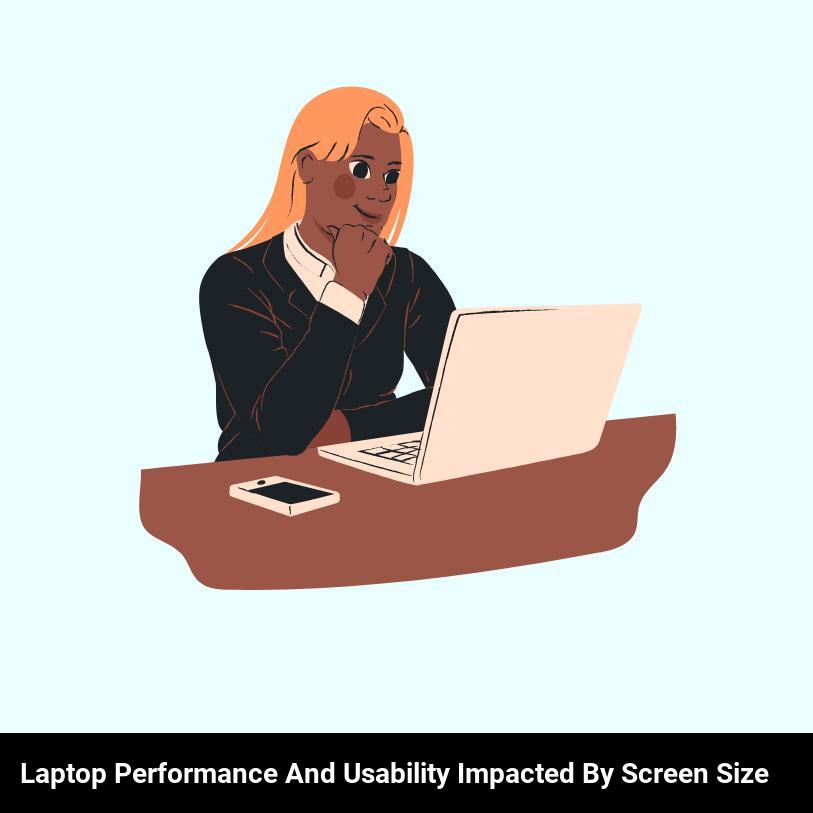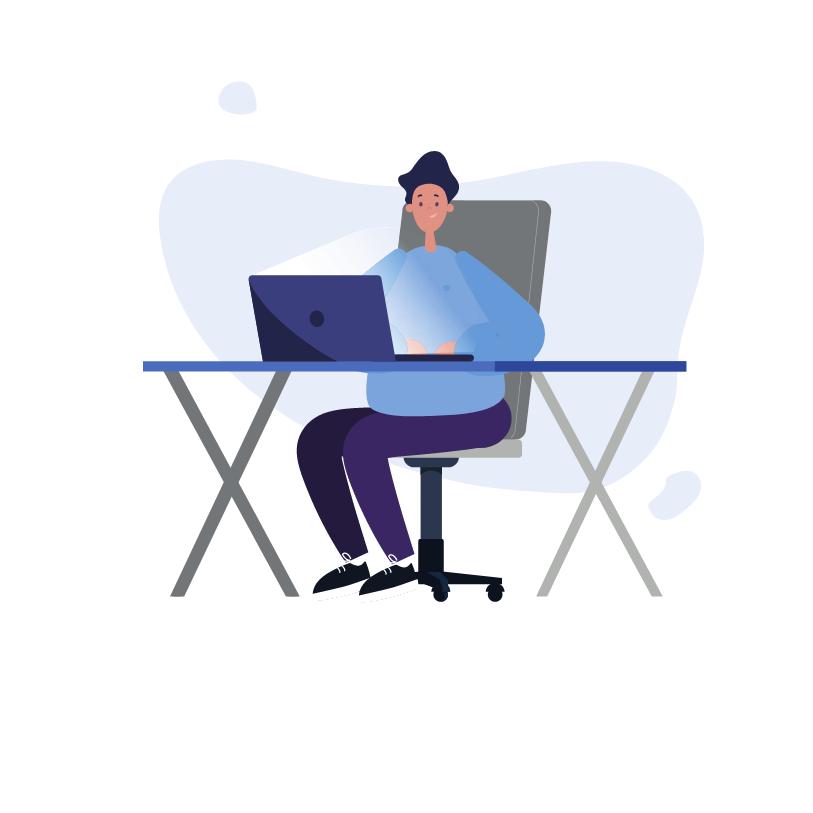As a laptop user, I know that the size of the screen can make a huge difference in both the performance and usability of the device. From streaming movies to crunching spreadsheets, the display size can affect how much I can get done without straining my eyes or slowing down my computer. In this blog, I’ll explore the impact of screen size on laptop performance and usability, discussing what factors to consider when choosing a laptop and how to optimize performance and usability regardless of screen size.

What factors should you consider when choosing a laptop based on screen size?
When choosing a laptop based on screen size, you should consider a few important factors. The most important of these is the type of tasks you’ll be using the laptop for. If you plan on using it for gaming or graphic design, then a larger, higher resolution screen size will be best. On the other hand, if you’re a casual user who simply wants to browse the web, then a smaller, lower resolution screen size may be more suitable.
The size of the laptop itself should also be taken into account. Larger screens will take up more space, making it difficult to transport your laptop. If you’re often on the move, then a smaller laptop may be a better option.
Additionally, you should consider the cost of the laptop. While larger screens can provide clearer graphics and better overall experience, they often come with a higher price tag. Be sure to weigh the cost against the performance you’re looking for and make an informed decision.
Finally, you should factor in the battery life of the laptop. Larger screens tend to consume more power, which will lead to shorter battery life. Before making your purchase, be sure to read reviews to see how long the laptop can last on a single charge.
Choosing a laptop based on screen size is an important decision, and there are several factors to consider. Be sure to consider the type of tasks you’ll be using the laptop for, the size of the laptop itself, the cost, and the battery life. Doing so will help you find the perfect laptop for your needs.
What are the drawbacks of having a smaller screen size on a laptop?
When it comes to laptops, smaller screen sizes can be a double-edged sword. On the one hand, a laptop with a smaller screen size can be incredibly lightweight and portable, making it great for travel. On the other hand, having a smaller screen size can come with some drawbacks.
One of the most obvious drawbacks of having a smaller screen size on a laptop is the reduced amount of display real estate. With less space, you have to work with fewer windows and can’t see as much of the content at once. This can be a problem when you’re trying to multitask, as you’ll be constantly switching between tabs and windows.
Another issue with smaller screens is the reduced clarity of text and visuals. A smaller screen means that images and text won’t look as sharp or crisp as they would on a larger display. This can be an issue if you’re working with detailed graphics or text-heavy documents.
Finally, having a smaller screen size can also lead to eye strain and fatigue. With less space, you’ll find yourself having to move your head and eyes more often to take in the content. This can lead to headaches, dry eyes, and other vision-related issues.
Overall, while having a smaller screen size on a laptop can provide certain advantages, it also comes with some drawbacks. From reduced display real estate to eye strain and fatigue, the downsides of a smaller screen size should be taken into consideration before making a purchase.
What type of tasks are best suited for laptops with larger screens?
If you’re looking for a laptop with a larger screen, then you’re in luck! Bigger laptops are ideal for performing a variety of tasks. From graphics-heavy multimedia projects to more intensive tasks like video editing and gaming, a laptop with a larger screen will help you get the job done. Plus, a larger laptop screen can make multitasking much easier. All that extra real estate can make it easier to open multiple windows and applications at once, allowing you to get more done in less time.
But a larger laptop screen isn’t just great for productivity. It can also be a great way to kick back and relax. With a bigger display, you can watch movies, stream your favorite shows, and get lost in a great video game. And if you’re the type who likes to keep your laptop open even when you’re not using it, a larger screen can provide a nice backdrop to your desktop.
A laptop with a larger screen can also be great for work. It can make it easier to read long documents, look up information online, and organize your work. Plus, if you do a lot of video conferencing, a larger laptop screen can be a great way to make sure you’re seen clearly by everyone on the call.
So, if you’re looking for a laptop that can handle a variety of tasks, a laptop with a larger screen is a great choice. It’s perfect for tackling multimedia projects, gaming, multitasking, and more. Plus, it can provide a great way to kick back and relax, or even increase your productivity.
How does screen size affect the performance of a laptop?
You may be wondering how screen size affects the performance of a laptop. Well, it turns out that screen size does play a role in how well your laptop runs and how comfortable it is to use. Here’s a look at how screen size can make a difference:
- Larger screens generally have higher resolution, which can improve clarity and make it easier to work with multiple documents at once.
- Smaller screens tend to have lower resolution, but they can also be more portable and take up less space.
- Larger screens may require more processing power from your laptop, which can cause it to run slower.
- Smaller screens may require less processing power, so your laptop can run more efficiently.
- Larger screens are better for gaming and watching movies, but smaller screens may be better for general computing tasks.
At the end of the day, it’s up to you to decide which screen size works best for you. Consider how you plan to use your laptop, how portable you need it to be, and what kind of performance you’re looking for. With the right screen size, you’ll be able to get the most out of your laptop and have a great experience.
What are the benefits of having a larger screen size on a laptop?
You don’t have to strain your eyes as much: With a larger screen size, you don’t need to move your eyes as much to look at different sections of the screen. You can get a better view of the whole screen and that makes it easier to read and work on it.
- More productivity: You can open multiple windows at once and work on them side by side which increases productivity. This is especially useful if you are working on a project or presentation.
- Improved gaming experience: For gamers, having a larger screen size means a better gaming experience. You can see more of the game and it makes it more enjoyable to play.
- Better ergonomics: Larger screens allow for a better posture since you don’t have to hunch over the laptop to see the screen. This helps to reduce strain on your neck and back.
In conclusion, having a larger screen size on a laptop has many benefits, such as improved ergonomics, better gaming experience, increased productivity, and less strain on your eyes. All these benefits make it worth investing in a larger screen size laptop.
How can you optimize your laptop’s performance and usability, regardless of its screen size?
Optimizing your laptop’s performance and usability doesn’t have to be a daunting task, no matter its screen size. Here are some easy steps to take to ensure your laptop is running at its full potential:
- Keep your laptop clean and dust-free. This will prevent any build-up of dirt and dust, which can slow down the process of your laptop.
- Update your system regularly. Keeping your laptop up-to-date with the latest software and hardware will allow it to run as smoothly as possible.
- Uninstall any unnecessary programs. Keeping your laptop free from any extra programs or applications that are not being used will help it to run faster.
- Make sure to run a disk defragmenter. This will help to organize the files on your hard drive and improve the performance of your laptop.
- Check your laptop’s power settings. Making sure the settings are optimized for performance will help you get the most out of your laptop, no matter the size of the screen.
By following these simple steps, you can ensure your laptop is running as efficiently and effectively as possible, regardless of its screen size.

Frequently Asked Questions
How does the size of laptop screens affect our daily tasks?
The size of laptop screens can have a huge impact on our daily tasks, as it affects how easily we can read or edit documents, watch videos, and navigate websites. Larger screens make tasks easier, as they provide more real estate to work with, while smaller screens can make it difficult to do any detailed work. The size of the screen also affects how quickly and easily we can access the tools we need while performing tasks, as well as how comfortable we are when using the laptop for extended periods of time.
What are the benefits of larger screens for laptop users?
The benefits of having a larger screen for laptop users are numerous! With a larger screen, you can enjoy a better viewing experience while working or playing games. You can also benefit from improved multitasking capabilities and more space to view multiple windows at once. Additionally, a larger screen makes it easier to read text and view videos and images in higher resolution.
Does screen size have any impact on the energy efficiency of laptops?
Yes, screen size does have an impact on the energy efficiency of laptops! Larger screens require more energy to power them, meaning that laptops with larger screens will use more energy than those with smaller screens. Additionally, larger screens can make laptops heavier, meaning they may require more energy to be carried around.
What are the implications of using a laptop with a small screen?
Using a laptop with a small screen can have some significant implications. For one, it can lead to a decrease in productivity due to the lack of space for multiple programs and windows to be open at once. Additionally, it can lead to eye strain and fatigue, as the user has to continually adjust the zoom and scroll to see different parts of the page. Finally, a laptop with a small screen can be more difficult to use and navigate, as the small size of the display can make it harder to read text and click on small buttons.
